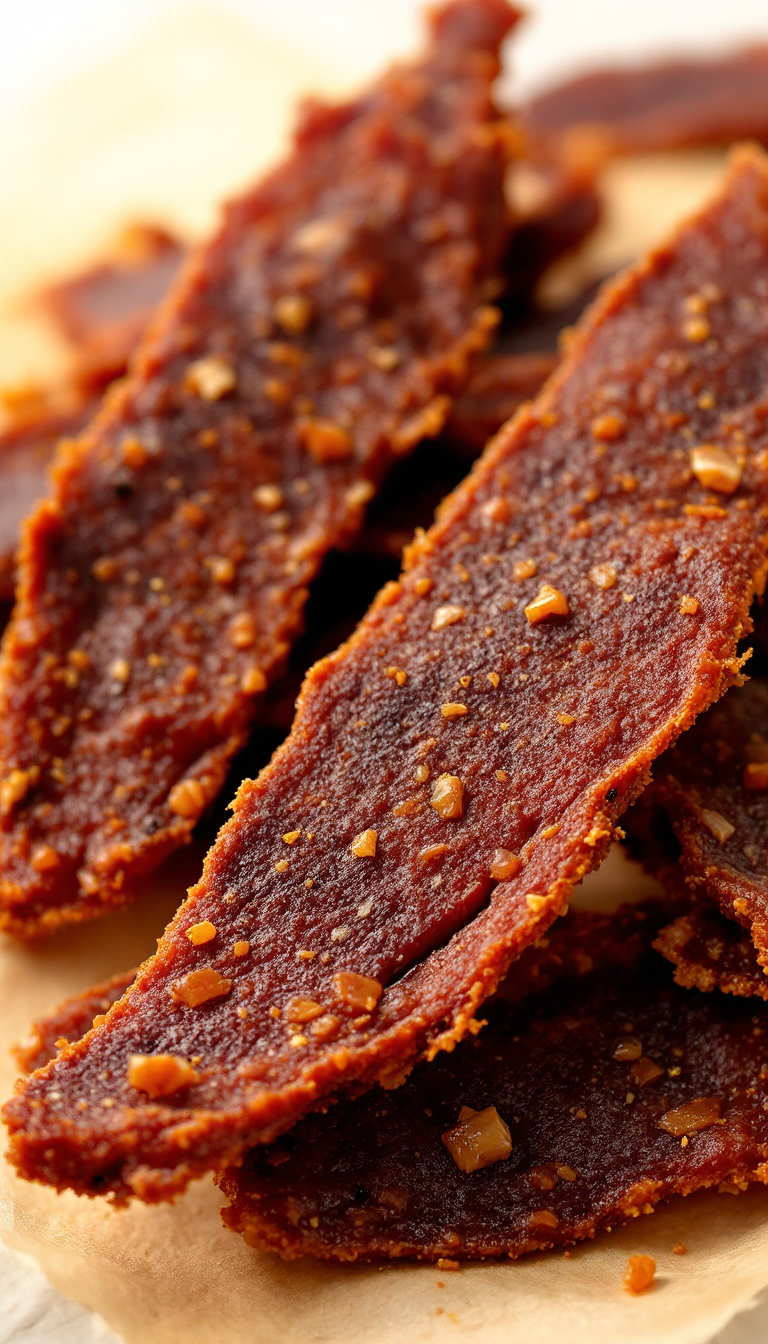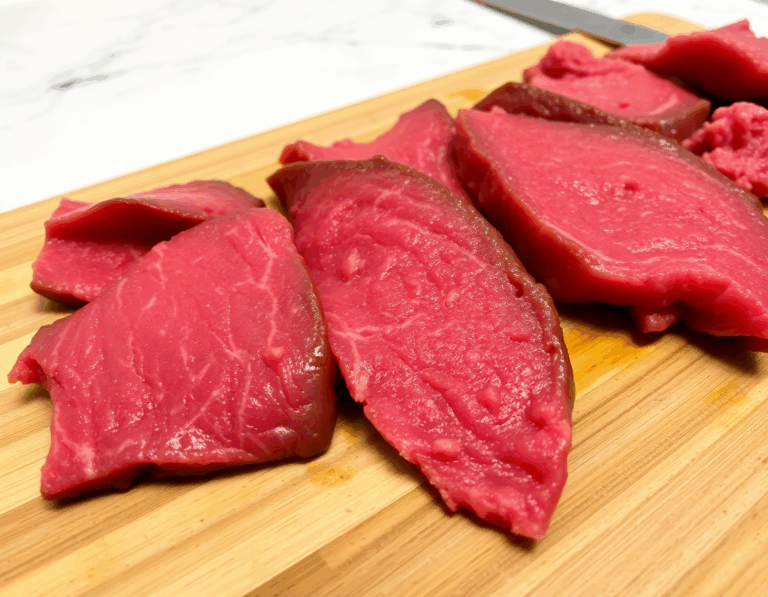
There’s something undeniably satisfying about crafting your own beef jerky at home. It’s like channeling your inner cowboy, but without the dusty trails or cattle drives—just the savory aroma filling your kitchen.
Imagine this: a lazy Sunday afternoon, the game on in the background, and you’re slicing up meat, marinating it with spices that dance together in a perfect, savory symphony.
The best part? You control the flavors.
Add a dash of heat or keep it mellow. It’s your jerky, your rules.
Steps
- Prepare the Meat: Begin by slicing the beef into pieces that are between 1/8 and 1/4 inch thick, cutting along the grain. If the roast is too thick, slice it horizontally to make it more manageable before cutting.
- Create the Marinade: Mix together brown sugar, soy sauce, Worcestershire sauce, smoked paprika, meat tenderizer, black pepper, red pepper flakes, onion powder, and garlic powder in a bowl. Whisk the ingredients until they are well combined and the sugar has fully dissolved.
- Marinate the Beef: Add the beef slices to the marinade, ensuring each piece is thoroughly coated. Cover the bowl with plastic wrap or use a large ziplock bag, then refrigerate for at least 12 hours or overnight, turning the meat or bag occasionally for even marination.
- Prepare for Drying: Line two baking sheets with aluminum foil for an easy clean-up and place a wire rack on each. Preheat your oven to 175°F and position two racks in the center of the oven.
- Dry the Meat: Lay the marinated beef strips in a single layer on the wire racks. Bake for 3 to 4 hours, rotating the pans midway through, until the jerky is dry, leathery, and chewy but still somewhat tender.
- Storage: Once cooled to room temperature, store the jerky in airtight containers, Ziploc bags, or glass jars. Properly dried jerky will last about a week at room temperature, or you can refrigerate or freeze it for longer storage.

Ingredients
- 3-pound eye of round roast, trimmed of fat and silver skin
- 1 cup packed dark brown sugar
- 1 cup soy sauce
- 3 tablespoons Worcestershire sauce
- 1 tablespoon smoked paprika
- 1 teaspoon unseasoned meat tenderizer
- 1 teaspoon freshly ground black pepper
- 1 teaspoon red pepper flakes
- 1 teaspoon onion powder
- ½ teaspoon garlic powder
FAQ
- What type of meat is best for making homemade beef jerky?
- A lean and well-trimmed cut of meat is ideal for making beef jerky. An eye of round roast is a great choice as it is lean, affordable, and easy to trim.
- Why is sugar included in the beef jerky marinade?
- Sugar is added to the marinade to help preserve the meat and lock in moisture, resulting in a tender and chewy texture similar to store-bought jerky.
- How should the meat be prepared before slicing for jerky?
- To make slicing easier, place the meat in the freezer for 1 to 2 hours before cutting it into slices between 1/8 and 1/4 inch thick.
- How do you know when the jerky is properly dried?
- The jerky is ready when it is dry to the touch, has a leather-like appearance, and is chewy yet still somewhat tender after cooling to room temperature.
- How should homemade beef jerky be stored?
- Store the jerky in an airtight plastic container, a Ziploc bag, or airtight glass jars. Properly dried jerky can be kept at room temperature for about a week, but it should be refrigerated or frozen for longer storage.
Tips
- Freeze the meat for 1 to 2 hours before slicing; this will firm it up and make it much easier to slice into even, thin pieces.
- Ensure the marinade contains plenty of sugar, as this not only helps in preserving the meat but also retains moisture, leading to a tender jerky.
- When marinating, turn the meat or flip the bag occasionally to ensure every piece is evenly coated for consistent flavor.
- Rotate the baking sheets halfway through the drying process in the oven. This helps in achieving an even drying for all the jerky pieces.
Equipment
- Wire Racks – Essential for arranging the marinated meat in the oven to dry out.
- Baking Sheets – Used to catch drips under the wire racks.
- Meat Tenderizer – If not available, this can be purchased, particularly one containing bromelain.
- Airtight Plastic Containers or Glass Jars – For storing the jerky once it’s made.
